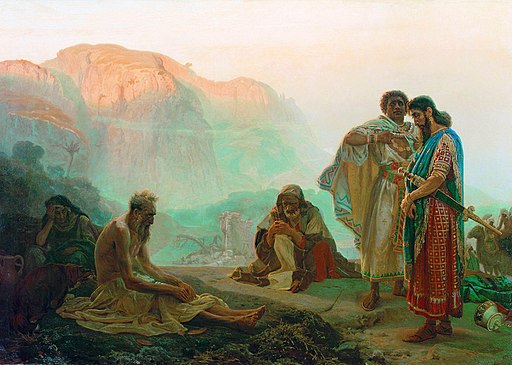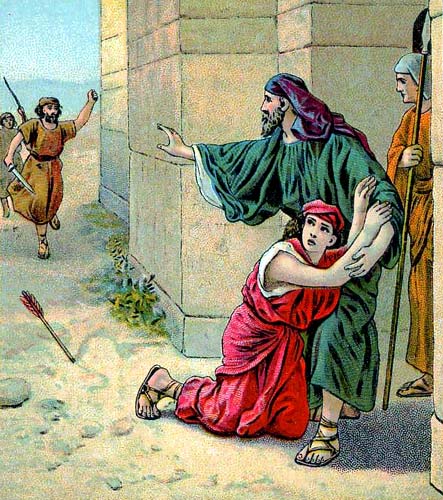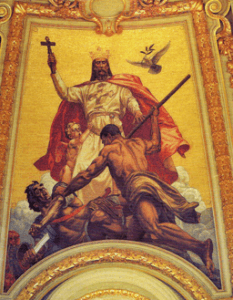by Lois Tverberg
When the tragic tsunami took the lives of over 200,000 people in Indonesia and other countries back in 2004, many were horrified by the suffering of so many people, and struggled with hard questions for God. Others discussed why it happened at that place and time, and wondered if it was an act of judgment from God. What would Jesus have said? Or Job? Let’s look at how these two key figures who were so acquainted with suffering would have seen the tragedies of today.
Wisdom from the Story of Job
It is interesting how the discussion around the tsunami resembled the debate between Job and his friends, Bildad, Eliphaz and Zophar. Job, of course, was a pious man who suffered for no reason he could find. His friends, however, asserted that God is all powerful, perfectly just, and knows every person’s sins, so therefore Job somehow had to have deserved his trials. Their logic seems flawless. Nonetheless, Job maintained his innocence and had very angry words for God about his lack of justice as he saw it. He bluntly said:
[God] stands alone, and who can oppose him? He does whatever he pleases… Why does the Almighty not set times for judgment? Why must those who know him look in vain for such days? Men move boundary stones; they pasture flocks they have stolen. They drive away the orphan’s donkey and take the widow’s ox in pledge. The fatherless child is snatched from the breast; the infant of the poor is seized for a debt.The groans of the dying rise from the city, and the souls of the wounded cry out for help. But God charges no one with wrongdoing. (Job 23:13; 24:1-3, 9, 12)
In the light of this harsh accusation, Job’s friends defended God, and said to Job:
“Far be it from God to do evil, from the Almighty to do wrong. He repays a man for what he has done; he brings upon him what his conduct deserves. It is unthinkable that God would do wrong, that the Almighty would pervert justice…Will you condemn the just and mighty One?” (Job 34:10-14, 17)
Truthfully, we must admit that Job’s friends have a very good point, and are trying to honor God. They echo many proverbs that say God rewards the actions of the righteous and punishes the wicked. If we didn’t know the rest of the story, we may even take their side.
God’s Surprising Response
It is fascinating to read God’s concluding words of the debate, because after all Job’s criticism, and the men’s strong defense of God’s honor, God was furious with Job’s friends! God said to Eliphaz,
“I am angry with you and your two friends, because you have not spoken of me what is right, as my servant Job has.” (Job 42:7)
It seems that God considered Job’s words that were spoken in anger at him to be truthful, while the other men’s theories defending his ways as untruthful. How could that be? We know that neither Job nor his friends knew God’s real reasons for allowing Job’s trials.
It wasn’t just that they didn’t know about Satan’s challenge, but that as finite humans, God’s eternal plan was utterly beyond them. God didn’t answer Job’s questions about evil because no human can grasp his unfathomable purposes. In spite of their ignorance, Job’s friends had the gall to presume to understand and speak for God, and accuse Job of sin. It should humble us when we want to put words in God’s mouth: how can we know for sure what he would say?
It is also interesting that God says that Job “has spoken what is right,” after Job’s accusations about God’s injustice toward the poor. When Job protested against their suffering, he actually was expressing the same compassion for the needy that God himself has. In contrast, Bildad, Eliphaz and Zophar’s theology had little concept of God’s love, so it was a misrepresentation of God’s heart.
While neither Job or his friends knew God’s future plans for redemption, Job at least understood God’s care for the suffering. Perhaps God would rather hear us ask angry questions that show concern for other’s pain, than for us to look for correct answers but not have love.
Our Christian culture tends to focus on theology concerning such things as the trinity, atonement, or free will vs. predestination, etc. Jewish culture over the millennia has tended to avoid this type of discussion because of the danger of the sin Job’s friends: claiming to have more knowledge of an infinite, mysterious God than we can possibly have. Since we are small and finite, we give God more honor by trying to love as he loves than to try to know all that he knows.
The Same Difficult Question in Jesus’ Age
The question of suffering came up often in Jesus’ time too, because he lived at a unique point in Jewish history. The people were greatly oppressed under Roman and Herodian rule, with extreme taxation and barbaric cruelty. Along with Jesus, thousands of other Jews were crucified by the Romans. Even before the Romans took power, the Greek Seleucids persecuted and executed any Jew who studied the Scriptures or circumcised their sons. Indeed, the suffering of the Jews before and during Jesus’ time was unmatched in their history until the Holocaust.1
This gave rise to an enormous theological problem that was reminiscent of Job’s situation: in the Old Testament, it was understood that when Israel suffered, it was because of its sins against God. The covenant at Sinai had been sealed with promises of blessings for obedience and curses for disobedience (Lev. 23, Deut. 28-29).
In Jesus’ time, for the first time in their history, they were being persecuted for their loyalty to God, and the most faithful people suffered most. Jesus responded at one point to this when he said:
Blessed are you who are poor, for yours is the kingdom of God. Blessed are you who hunger now, for you shall be satisfied. Blessed are you who weep now, for you shall laugh. Blessed are you when men hate you, and ostracize you, and insult you, and scorn your name as evil, for the sake of the Son of Man… But woe to you who are rich, for you are receiving your comfort in full. Woe to you who are well-fed now, for you shall be hungry. Woe to you who laugh now, for you shall mourn and weep… (Luke 6:20-26)
When we first read Jesus’ words, they seem too harsh. Why would Jesus proclaim that anyone who has enough to eat will go hungry? Or why would he want those who are happy to weep instead? Jesus was repeating many of the blessings and woes of Deut. 28, but instead of describing this life, he was saying that God’s reward will come later to many who did not feel his blessing here.
Indeed, those who were most faithful in trials will be rewarded most greatly. We cannot look at a persons’ earthly blessings and say that we know how much God approves of our lives. To the contrary, those of us who are comfortable should examine ourselves to see if we the ones who Jesus is speaking against.
Were The Galileans Worse Sinners?
A discussion very close to that about whether the tsunami was God’s judgment came up in Jesus’ life, when some Jews were murdered by Pilate:
Now there were some present at that time who told Jesus about the Galileans whose blood Pilate had mixed with their sacrifices. Jesus answered, “Do you think that these Galileans were worse sinners than all the other Galileans because they suffered this way? I tell you, no! But unless you repent, you too will all perish. Or those eighteen who died when the tower in Siloam fell on them – do you think they were more guilty than all the others living in Jerusalem? I tell you, no! But unless you repent, you too will all perish.” (Luke 13:1-5)
Once again, people were asking Jesus whether misfortune showed that God was punishing sin, and Jesus said this was not true. Instead, he reminded them that true judgment will come some day, but this age is a time of grace, when God is seeking out sinners and calling them to repent. Rather than feeling secure if we are prospering because we think we have God’s approval, Jesus says that we should examine ourselves, because soon it will be too late.
Looking at the Tsunami
As we study these examples from Job and from Jesus’ own words, we can see that questions like, “Why did God send a tsunami?” aren’t ones that God will answer to our satisfaction. God showed Job that the answers were utterly beyond him by challenging him to be a god himself — no human could hope to understand God’s ways.
When Jesus was here, he reminded us that misfortune here is not God’s judgment because in this life we are under his mercy. We should therefore examine ourselves now and come to him for forgiveness, because judgment will come in the end.
Whenever we see innocent people suffering, we can at least remind ourselves that while they would not have chosen their fate, God willingly came in the person of Christ to suffer as an innocent person out of his desire to forgive his people’s sins. That should always remind us of his empathy for suffering and his goodness, in which we can always put our trust, even if we don’t know all of his thoughts.
~~~~
Photos: Ilya Repin [Public domain], Brooklyn Museum [Public domain],







